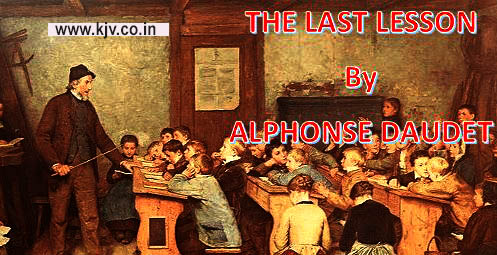The Last Lesson Class 12 Questions and Answers English
The Last Lesson
Question & Answers
Q.1. What was Franz expected to be prepared with for school that day ?
Ans: Franz was expected to be prepared with a lesson on ‘participles.’ His teacher, M. Hamel, had mentioned that he would question the students about participles.
Q.2. What did Franz notice that was unusual about the school that day ?
Ans: Franz noticed something unusual about the school that day. Normally, there was a lot of noise when school started, but today it was as quiet as a Sunday morning. Even though he was late, M. Hamel didn’t scold him. Franz also saw some village people sitting in the back of the classroom.
Q.3. What had been put up on the bulletin board than morning ?
Ans : Every important news or public announcement was put up on the bulletin board. For the last two years all their bad news had come from it. The news of the lost battles, the draft, the order of the commanding officer – all come out from the bulletin board. Franz wondered what could be the news that day.
Q.4. What changes did the office order from Berlin cause in school that day ?
Ans: The order from Berlin caused a lot of sadness in the school that day. It upset all the students and disappointed M. Hamel. It was their last French lesson because, starting the next day, only German would be taught in the schools of Alsace and Lorraine. They realized for the first time how important their French language was once it was being taken away.
Q.5. How did Franz’s feelings about M. Hamel and school change ?
Ans: The order from Berlin made Franz feel deeply moved and patriotic. He suddenly appreciated his own language and school more than ever. His books seemed like old friends now. He began to respect M. Hamel, forgetting about the times he was scolded or how strict he had been.
Understanding the text
Q.1. The people in this story suddenly realise how precious their language is to them. What shows you this? Why does this happen ?
Ans: The people suddenly realized how important their language was when Berlin ordered that only German be taught in schools in Alsace and Lorraine. This upset them and made them feel patriotic. M. Hamel called French the most beautiful and logical language, and Franz became emotional, feeling regret and love for his language and teacher, knowing it was their last French lesson.
Q.2. Franz thinks, ‘Will they make them sing in German, even the pigeons? ” What could this mean ?
Ans: Franz’s thought, “Will they make the pigeons sing in German too?” reflects his feeling that even though the Germans were forcing their language on the people of Alsace and Lorraine, they couldn’t completely erase the French language and culture. Just like pigeons have their own way of singing that can’t be changed, French was a part of the people’s identity that couldn’t be taken away.
Talking about the text
Q.1. “When people are enslaved as long as they hold fast to their language it is as if they had the key to their prison.”Can you think examples in history where the conquered people had their language taken away from them or had a language imposed on them ?
Ans : In America and Australia the conquered races imposed their languages on the natives. English was imposed in North America and Australia. Spanish and Portugues were imposed on the people of Latin American countries.
Q.2. What happens to a linguistic minority in a state? How do you think they can keep their language alive?
For example : Punjabis in Bangalore, Tamilians in Mumbai, Kannadigas in Delhi, Gujratis in Kolkata
Ans : A linguistic minority has to face a lot of hardship in a state. They have to speak in a language which is to them quite unfamiliar and different from their own. As a result they face the problem of expression. Education is also imparted to them in a strange language which is not their own. As a result it hinders their progress. Because it is proven that the mother tongue is the best medium to understand,to learn and to express. The punjabis in Bangalore, the Tamilians in Mumbai, the kannadigas in Delhi and the Gujratis in kolkata have to face the problems of language. It is not an easy task to learn a different language. And so they will be like fish out of water where they have to listen to a different language.
They can safe-guard their languages by virtue of their love for them. They must hold fast to their mother tongue even in the most complex situation. They should try to keep their language alive through their culture and tradition.
Q.3. Do you know what ‘linguistic chauvinism ‘ means ?
Ans : Linguistic chauvinism means an absurdly extravagant pride in one’s language. Germany of Bismarch reflected that pride. German ‘Linguistic chauvinism was reflected when it imposed German on the French speaking population of Alsace and Lorraine.



